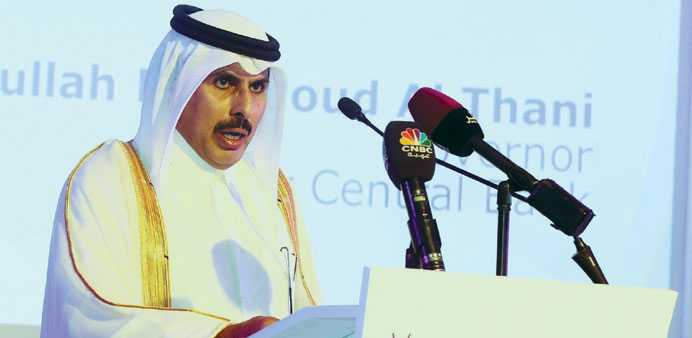By Santhosh V Perumal/Business Reporter
Qatar’s low insurance penetration is “a revealing factor” of great opportunities, Qatar Central Bank Governor HE Sheikh Abdullah bin Saud al-Thani has said.
The country’s current level of penetration is around 0.5% of GDP (gross domestic product) and 1.6% as share of the insurance as part of the global business sector, Sheikh Abdullah said in his keynote address at the ninth MultaQa conference.
“This very small percentage can be seen as a revealing factor of great opportunities,” he said in his keynote address.
Total premium collections in Qatar amounted to $2bn in 2013 and the five listed insurers - Qatar Insurance, Qatar General Insurance and Reinsurance, Al Khaleej Takaful, Doha Insurance and Qatar Islamic Insurance - together account for 90% of the market.
Asserting that it is the desire of Qatar to reduce reliance on energy, Sheikh Abdullah, who is also the chairman of the Qatar Financial Market Authority and the Qatar Financial Centre Regulatory Authority, said the country’s insurance sector has been undergoing significant evolution and is in the process of establishing a committee for supervision of risk management.
The insurance sector has experienced rapid changes, be it local, regional or international, he said, adding sector regulations are in line with the International Accounting Standards as far as governance and prudential limits are concerned.
Highlighting the need for strengthening the solvency regime in the insurance sector, he said it will have a positive impact in the economy of Qatar.
Ace Eurasia and Africa president Giles Ward said the Middle East and North Africa (Mena) region has great (re)insurance potential, but also faces potentially devastating challenges.
Echoing Sheikh Abdullah’s view, he said the insurance penetration levels remain “tantalisingly low” and that the combined size of the Mena insurance markets is still only the size of Belgium’s.
Although Mena offered immense scope, he said “we need to be realistic about the scale, and the problems we need to navigate through.” Mena insurance risks include geopolitical risks and the current pressure on oil prices, he said, adding the region needed to reduce its reliance on cheap reinsurance capacity and cede less.

Sheikh Abdullah: ‘Revealing factor’ of opportunities for insurance.
